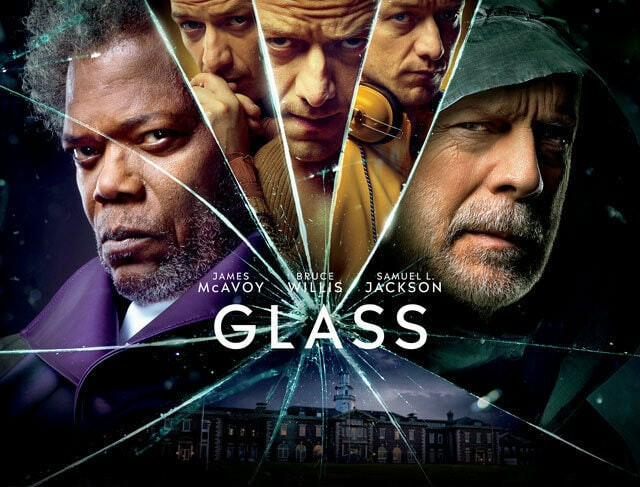Contact Us
- Church Office: 158 1st Place NW Issaquah, WA 98027
- Sunday Service: 5025 Issaquah Pine-Lake Road SE Issaquah, WA 98029
- Connect Card
- Subscribe to All-Church Email


The Gospel According to GLASS
Genesis tells us that when God made humanity he made us in his image and likeness. As a result of this profound truth, we believe we can find God's truth and wisdom streaming out of our movie theaters, our novels and even our rock shows, because every artist, director and actor bears the image of God. The same is true of M. Night Shyamalan and his latest movie Glass.
Shyamalan became one of our generation’s most beloved directors with his hit movies the Sixth Sense and Signs. Original and terrifying his movies almost always contain imaginative twists that keep you on the edge of your seat. Though he has made some bad films over the years, his Rolling Stone interview reveals that his goal is to give it his all,
“I gave it my all, so the audience, when they come pay their money, they see an artist that gave everything he had, and risked everything. … If it doesn’t work out, I gave it my all.”
His last three movies have formed a trilogy of which Glass is the climax. Just as Unbreakable (2000) introduced the hero and Split (2017) introduced the villain, now in Glass (2019) we have the show down between the two, or so we believe.
The reason Glass has garnered so much attention, and grossed over 100 Million around the world, is that both the villain and the hero seem unbeatable. Bruce Willis’ character is so “unbreakable” that even a massive train wreck leaves him unscathed, while James McAvoy’s character is strong enough to be shot with a shotgun at point blank range and walk away to fight another day.
As Glass unfolds and the tensions rise, we learn that the only hope for humanity is if McAvoy’s character can allow his other more tender personalities to emerge instead of the man-eating Beast. Thankfully we learn that Anya Taylor-Joy’s character has the power to make this happen. Because of her childhood suffering at the hands of her uncle, she is able to press through the Beast’s tough exterior and show McAvoy’s highly disturbed character the rare and gentle kindness of friendship.
She risks her life to hold his hand in the middle of his rage and by doing so, Taylor-Joy becomes the everyday superhero the whole trilogy is seeking to create.
This risky act of love produces the most moving scene in the movie. She bonds with this terrifying killer by showing him love and calling him by his name. Her compassion snaps him out of Beast mode and he looks at her confused. He says,
“You’re gonna be my friend? Then I’m gonna hold the light til the end”
When everyone else in the movie is aiming to defend themselves against this character or to take him down, her bold compassion is the last thing the audience expects to see. Embedded in this encounter we can see the surprising gospel of Jesus Christ shining through.
All of us, like McAvoy, have a dark side which the Bible calls our sinful nature. When we operate out of this broken place inside of us, we hurt others and don’t think twice about it. This is why the Apostle Paul can write in Romans 7,
“For I know that good itself does not dwell in me, that is, in my sinful nature. For I have the desire to do what is good, but I cannot carry it out” (Romans 7:18)
This split personality drives him practically insane and eventually he cries out “What a wretched man I am! Who will rescue me from this body that is subject to death?” (Romans 7:24).
There seems to be no hope for us either who are considerably less holy than the Apostle Paul. But we have a compassionate Savior who loves us in our darkest moments just like Anya Taylor-Joy loves the man behind the Beast.
Paul talks about this compassionate Savior in Romans 7 and answers his own despairing question. He turns from howling in pain to hallelujah’s of pleasure “Thanks be to God, who delivers me through Jesus Christ our Lord!... I am convinced that neither death nor life, neither angels nor demons, neither the present nor the future, nor any powers, neither height nor depth, nor anything else in all creation, will be able to separate us from the love of God that is in Christ Jesus our Lord” (Romans 7:25; 8:28-29)
Despite the many messages embedded in Glass, this is the one where the Gospel shines most strongly. No matter how dark our desires, or our deeds become, we have one who is fearless in the face of it, who steps forward to take our hand, to speak our name and to show us undeserved love and compassion. His name is Jesus!
As New Testament scholar Leon Morris observes,
“God does not wait passively for sinners to come to him, but actively seeks them out...The rabbis agreed that God would welcome the penitent sinner. But it is a new idea that God is a seeking God, a God who takes the initiative.” [1]
[1] Leon Morris, Luke: Tyndale New Testament Commentaries (William B. Eerdmans, Michigan), 260-261.
Comments
Login/Register to leave a comment